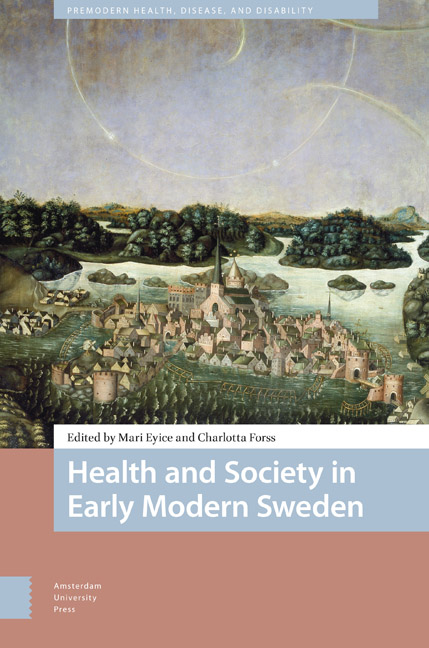Book contents
- Frontmatter
- Contents
- List of Tables and Figures
- Acknowledgements
- 1 Meanings of Health in Early Modern Sweden
- 2 Illness as Incapacity to Work in Early Modern Sweden
- 3 The Body in the Bathhouse: Health and Bathing in Early Modern Sweden
- 4 ‘Somewhat Heated, Quick and Lively’ : Humoral Explanations of the Learning Difficulties of Charles XI of Sweden (1655–1697)
- 5 Health in Body and Soul in a Female Birgittine Convent 1516–1522
- 6 Curing Madness and Mental Disturbances : Religious Healing Activities in Early Modern Swedish Local Communities
- 7 Not Quacks but Close : Reappraising the Role of Physicians on the Eighteenth-Century Medical Market
- 8 Gender, Health, and Hair in Sweden, 1740–1840
- 9 Gender Norms and Early Modern Healthcare : Barber-Surgeons in Sweden c. 1600–1900
- Epilogue : Epistemologies of Body and Soul: Considering the Early Modern and (Late) Modern History of Health
- Index
7 - Not Quacks but Close : Reappraising the Role of Physicians on the Eighteenth-Century Medical Market
Published online by Cambridge University Press: 16 April 2024
- Frontmatter
- Contents
- List of Tables and Figures
- Acknowledgements
- 1 Meanings of Health in Early Modern Sweden
- 2 Illness as Incapacity to Work in Early Modern Sweden
- 3 The Body in the Bathhouse: Health and Bathing in Early Modern Sweden
- 4 ‘Somewhat Heated, Quick and Lively’ : Humoral Explanations of the Learning Difficulties of Charles XI of Sweden (1655–1697)
- 5 Health in Body and Soul in a Female Birgittine Convent 1516–1522
- 6 Curing Madness and Mental Disturbances : Religious Healing Activities in Early Modern Swedish Local Communities
- 7 Not Quacks but Close : Reappraising the Role of Physicians on the Eighteenth-Century Medical Market
- 8 Gender, Health, and Hair in Sweden, 1740–1840
- 9 Gender Norms and Early Modern Healthcare : Barber-Surgeons in Sweden c. 1600–1900
- Epilogue : Epistemologies of Body and Soul: Considering the Early Modern and (Late) Modern History of Health
- Index
Summary
Abstract
This chapter reassesses the relationship between physicians and the eighteenth-century Swedish state. It argues that physicians’ connection to the state was rather tenuous throughout the period, and that they were neither considered nor treated as an important part of the cameralist machine of governance. This is a position which runs contrary to earlier historiography, which has tended to portray eighteenth-century physicians as forerunners to nineteenth- and twentieth-century branches of the state that are concerned with social medicine, hygiene, and general improvement of the health of the population. By giving examples of how physicians operated in different roles on the Swedish medical market and in relation to the state, the chapter points to the sprawling complexity of early modern health practices.
Keywords: eighteenth-century medicine, Enlightenment, medical market, social medicine
Introduction
Physicians often tend to be seen as holding the top position in the hierarchy of health practitioners. In prior research, they often come across as aloof, high-status figures, who in the eighteenth-century paired up with the state to regulate, oversee, and improve the activities of all other health practitioners. This chapter argues that Swedish physicians’ connection to the state remained tenuous throughout the eighteenth century. I contend that physicians were not particularly important to the state, except as one of many groups of actors on a medical market. They were, to put it bluntly, neither considered nor treated as an important part of the machine of governance. That is not to say that they were completely unimportant, but neither were hatters, cobblers, or indeed barber-surgeons or midwives inconsequential. This, of course, is a position that runs contrary to earlier historiography, which has tended to portray eighteenth-century physicians, and in particular their main organisation the Collegium Medicum, as forerunners to nineteenth- and twentieth-century branches of the state that are concerned with social medicine, hygiene, and general improvement of the health of the population. By giving examples of how physicians negotiated with other groups and operated in different roles on the Swedish medical market and in relation to the state, this chapter instead points to the sprawling complexity and open-ended nature of early modern health practices. To create a more complex, and hopefully also more truthful, description of the role of physicians in eighteenth-century Swedish society, I take as my point of departure two propositions, which underlie the argument of the present chapter.
- Type
- Chapter
- Information
- Health and Society in Early Modern Sweden , pp. 151 - 174Publisher: Amsterdam University PressPrint publication year: 2024

